Introduction
Unfortunately, so many people struggle with IBS or Irritable Bowel Syndrome. This condition comes with extremely debilitating symptoms. The cramping, abdominal pain, bloating, gas, diarrhea or constipation (or both). These are so disruptive that IBS patients often find themselves on the brink of desperation to live a normal life again. And with the rise of awareness about this issue, it can be confusing to navigate all of the available information on successful IBS treatment.
So if you have IBS or someone you love does, this week’s Goodness Lover Podcast is exactly what you need! This week, we sat down with Dr. Sarina Pasricha — a board-certified gastroenterologist — to talk all about IBS, what causes it, the best ways to treat it, and so much more!
Watch the Interview:
Dr. Pasricha explained:
🌱 The best diet and lifestyle to properly nourish and treat IBS
🚽 Why uncomfortable bowel movements are often associated with IBS
👨⚕️ Symptoms to look for if you are concerned about IBS
🤕 Why stress reduction is essential to relieving IBS symptoms
🦠 How movement, exercise, and food can impact mental health and IBS
🙌 Stories of real-life patients whose IBS were successfully treated
😷 The future of IBS treatments
Additional Resources
To connect with Dr. Sarina and discover more of her work, you can find her on Instagram and Facebook. You can also visit her website here.Transcript
Sarah: Hello and welcome back to the Goodness Lover Show. Today, we are joined by Dr. Sarina Pasricha who is a gastroenterologist, and she's here to talk to us all about IBS, irritable bowel syndrome and what you can do to treat it, how it's caused and the multi-pronged approach that is the most effective. Sarina is a wonderful person and super knowledgeable, so I'm sure you'll get a lot out of this talk. Let's get into it.
Dr. Sarina Pasricha, we're so happy to have you here today. We know that you've been a friend of Goodness Lover for a while. You're friends with our fan favorite, Dr. Dr. Will Bulsiewicz, so it's great to have more of the gang together. You're a gastroenterologist and we are so excited to dive into the topic of IBS today. Thanks so much joining us.
Dr. Sarina Pasricha: Thank you guys so much for having me. Yes, I have been a fan favorite and I am honored and excited to be here today. And I hope to educate your listeners and give you guys some more information about gut health, irritable bowel. I love GI, so anything I can do to talk about it, I will.
Sarah: Awesome. Well, let's start off with a little bit about you. Why did you decide to specialize in gastroenterology and gut health? Dr. Sarina Pasricha: Yeah. So, I actually have known for a long time, I knew when I was a kid that I wanted to go into medicine. I was in a life-threatening, very serious car accident when I was in second grade and I had to be airlifted to the closest hospital. And that really spurred my own interest in medicine. And interestingly enough, my life has kind of taken a full circle and I'm now working back at the place that I was airlifted back when I was a kid. And the thing about GI... Actually, so what happened was... Your spine is supposed to be on each other and my neck got dislocated.
Matt: Mm-hmm (affirmative).
Dr. Sarina Pasricha: I was in a full body cast. It went from my head down to my hips for several months and it was really scary and they didn't know if I was going to walk. They did not know if I would ever be able to play sports. And so, that really changed my whole perspective on life, and I did not know much about medicine before that, but of course, being in the hospital and being taken care of by such wonderful nurses, doctors, physical therapists just kind of changed the trajectory of where I was going to be. I'm very grateful now to be healthy and doing the things that I want to do.
And that's just really my goal in medicine is I want everybody to be healthy and happy so that they can live their best lives and they can do the things in this life that they were meant to do. And I really loved gastroenterology because it's one of those medicine fields where you have patients come to you with GI symptoms or symptoms in general, and you actually get a look inside their body and see what's going on. It's not just guesswork, but a lot of times, we're going in, I'm looking at the stomach, I'm looking at the colon, I'm looking at the small bowel. And so, that to me is just really fascinating that I can see somebody in the outside as well as the inside. And really GI is such a holistic field and we'll get more into that when we talk about irritable bowel, but the gut is really the root of so many medical issues. And if you can get your gut healthy, your GI system on track, then you just feel better.
So, I do love this field and it's really an evolving field, like what I'm now is really different than what I learned in training five to 10 years ago. I always had this interest in nutrition. I studied at Harvard for my undergraduate, and I was very fortunate at that time to work in a lab with somebody named Dr. Allen Walker. He was the director of nutrition at the children's hospital. And I actually took six months off from college, because I was working in the lab with him, looking at women supplements and how do vitamin supplements affect the GI tract in children. And so, this interest in nutrition just kind of grew from there and that's kind of one thing led to another and I just continued to love GI.
Sarah: Wow.
Matt: That's cool. I'm guessing when you started your journey to be a gastroenterologist, you weren't thinking that it was all of a sudden going to be the coolest thing to study once the gut like took off.
Dr. Sarina Pasricha: That's right. In the beginning, like I said, we did not know much about gut health. In my medical training, we really did not talk about it. We did not know much about the gut microbiome, if anything, I don't think I learned it at all in my medical school. And for me, my journey on gut health and the gut microbiome actually started after I had my first child. I was a gastroenterologist fellow so I was training. And actually, that's how I know Dr. Will Bulsiewicz as we were training together. And my husband, who's also a physician, he had to go do an away rotation for a few months. So, it was just me and my baby and I was exhausted. I was nursing her every few hours at night, and then I would wake up, I would go to work. I would do procedures, see patients, I would take time to go and nurse, and I was just literally exhausted, fatigued.
And I started wonder like, "Did this matter? Did nursing my child make a difference or was it the same to give breast milk? Like, did I need to do all this?" I was putting a lot of strain on my own body. And that's when I started to do research and realize the power of breast milk, for example, and how important that is in developing the gut microbiome in children. There's something called human milk oligosaccharides, HMOs and that feeds all that healthy gut bacteria in our children. So that's, for me, how I got on this journey of gut health. It was kind of out of desperation to see is this something necessary? And the more I researched and the more I learned about this field, I just realized that as a mom, I wanted to do everything I possibly could to give my children a healthy foundation. And then in doing so, I realized, I also had to change my own habits, because I was not living the healthiest life either in terms of my diet and lifestyle, and so I made changes too.
Matt: Wow. So, IBS is obviously a huge problem. And what has it been like, I guess, coming from your traditional training to where you are now? You mentioning these lifestyle changes and these new that you grow into, how does that impact IBS? And maybe just start, what is IBS for someone that doesn't know what it is? But then quickly, yeah, I'd be really curious as to how even your focus on IBS has changed through this transition?
Dr. Sarina Pasricha: Yeah, definitely. So, let's just start with some of the basics. What is irritable bowel? How common is it? So, irritable bowel syndrome is a syndrome, and what that means is that there is not one single test, there's not one single imaging or procedure that is going to diagnose a patient with irritable bowel. It is a whole cluster of symptoms. So, people usually have abdominal pain often associated with pooping. People usually have a change in their bowel habits. They can either have constipation or they can have diarrhea. And there's often a change in form, maybe the bowels are more loose, maybe they're harder. And all of these things have to be over a certain period of time. There's some chronicity to it, it's not acute. So, irritable bowel syndrome can be really frustrating for patients. And it can actually take a long time to diagnose, because like I said, there's not a lab test I can order and tell you, you have irritable bowel.
It actually takes months for many patients to be even diagnosed with irritable bowel. But what I will tell you is IBS is very, very common. It is seen about in one in four to five patients in GI, one to four patients have it. So, about 20% of the patients have irritable bowel. And interestingly, there was a study that just came out showing that during this period of COVID and the pandemic, we've seen a significant rise in IBS symptoms and patients who have IBS. And so, it really affects people's quality of life. People are experiencing pain, discomfort, bloating and a whole host of issues. There was a study that was done and they asked patients with IBS, "If I were to be able to give you like a magic pill that would cure your IBS, but the only caveat is that there's a 1% chance of death. Would you take this pill?" And the majority of patients with IBS said, "Yes."
Sarah: Wow.
Matt: Wow.
Dr. Sarina Pasricha: That to me, that just goes to show you how much this is affecting people's quality of life that they would be willing to take a pill that would cure their symptoms, they would go back to normal, but they're willing to do that with a 1% chance of sudden death. So, I was lucky to train with Dr. Doug Drossman and he's one of the founders of IBS. He actually developed and helped develop the Rome criteria, which is what we use to diagnose patients with IBS. So, I was lucky to have had a holistic training and to learn a little bit about how stress plays a role in patients with IBS, because that's a frustrating thing is that people think it's all in their head. And in fact, they'll come to me and they'll say, "I've seen a lot of doctors and I don't know what's going on, but I know I have pain, and I just think it's in my head." And truthfully, we used to think IBS was a psychiatric illness. We used to tell patients, "This is not your gut. This is not GI-related. These symptoms that you're having are all psychiatric and you need to see a psychiatrist."
We now know that is not the case at all, that is not true. And we have research studies to back that up. We have done studies where we have taken a rectal probe, and a rectal probe, and on the end, there's a balloon and we put it in people's bottoms and we inflate it. And we ask patients with irritable bowel and without irritable bowel to tell me, when do you start to experience pain? And the research shows that patients with irritable bowel experience pain much earlier than patients who do not have irritable bowel. So, this is objective scientific information that shows that patients are really experiencing pain, discomfort. And there are studies to show that the nerves have become altered in patients with irritable bowel. So, we used to think it was the brain, we know that's not the case now.
We know that there is a brain-gut connection and the gut and the brain are in constant communication. They're like best friends, they're chatting all the time, they're hanging out. And they have like the vagus nerve and a fast super highway that's going back and forth, constantly sharing information. And so, we know that the gut is definitely involved and in fact, the gut has its own nervous system. It has something called the enteric nervous system. There are over 500 million nerves in our GI tract. To put that in perspective, there's more nerves in our GI system than in our spinal cord. And I studied and I majored in biological anthropology, so I'm always interested in evolution and health in a social context. And we know that the gut and the gut nervous system evolved before the brain. So, people call the gut the second brain, but really, it's the first brain. It came first and it's really important, but we'll give the brain credit too. So, fine, the gut is called the second brain.
And there is this cycle where if you have something going on in your brain, if you feel stressed, anxious, worried, it sends signals right to your gut. And you're going to experience symptoms. You might have pain, you might have diarrhea, you might have constipation. And then when you start to get some of those symptoms and pain, it sends that signal right back to your brain that, "Hey, I'm about to have a flare of some of this stuff." And it causes you more stress, right?
Sarah: Yeah.
Dr. Sarina Pasricha: And we've all experienced it to some degree, like you've had butterflies in your stomach, right? And that's kind of a minor version of irritable bowel. That's your body telling you that something's going on. I'm either really excited or I'm nervous or I'm anxious about something. So, we've all experienced that to some extent, but patients who have IBS, they have it to a much more severe and debilitating stage and it can cause a lot of pain. So, that's a little bit about IBS and I will say, that's what we thought was going on. And now, there's a third part.
Sarah: Okay.
Dr. Sarina Pasricha: Now, we know it's not just the brain, it's not just the brain and the gut, but it's the gut microbiome that's involved too. And all three of these pieces are really important in preventing, in diagnosing irritable bowel syndrome. You really can't talk about IBS without understanding each of these three parts.
Matt: Excellent.
Dr. Sarina Pasricha: And I know you guys have had a number of podcasts on gut health and the gut microbiome, but just to kind of review and reemphasize for listeners who may not fully understand, we have trillions and trillions of gut microbes in our gut. And we all have good bacteria and bad bacteria. And there are things that we can do to improve the good bacteria.
And there's things that we can do that are harmful and kind of increase the bad gut bacteria. And if that becomes out of balance and becomes out of whack, then we feel it. And that's what's called gut bacterial dysbiosis, which is also referred to for many people as leaky gut. There is just one single layer of cells in our GI tract and it prevents bacteria and harmful things from going back and forth from within our GI tract to our blood, it's called the gut blood barrier. Many people know of the brain blood barrier, but there's also the gut blood barrier. And so, when that becomes abnormal, we can get a whole host of medical issues. You can get arthritis and inflammatory diseases, heart diseases, cancer, but you also get GI issues and IBS is one of those issues. So, that was not a short answer.
Matt: No, that's great.
Sarah: No, it was a fantastic introduction. I love it.
Matt: I love it.
Dr. Sarina Pasricha: That's basically what irritable bowel syndrome is. It's an alteration in any one of those three areas, the brain, the GI tract, or the gut microbiome.
Matt: Excellent. So, a lot of people in our community come to us, sort of watching the podcast or whatever, or have watched one of our series, and they're on a really restrictive diet. They feel like they can't eat much because everything upsets their gut. So, when someone like that presents to you as a patient, what are some of the strategies that you start them with to start to reintroduce foods or to support-
Sarah: Or help them uncover the reason to their issue.
Matt: ... yeah, to the bottom of what's happening now?
Sarah: Yeah.
Dr. Sarina Pasricha: Yeah. So, I see this all the time and what I see with my patients with IBS is... You're exactly right, they have gone completely to a restrictive diet. And the reason is because they'll tell me, "Doctor, this is what happens. I eat Brussels sprouts one day and I'll get severe pain. So, I have now eliminated Brussels sprouts. Now, I eat broccoli on a different day and I get the symptoms, so I think it's the broccoli. I have now completely eliminated that." And this is what they do with every food because they often will keep a food diary, which at times can be helpful, but they go through the list and anytime they have GI symptoms, they think that they're intolerant, that they have a food sensitivity, that they might have an allergy and they eliminate it.
And what I try to explain to my patients is first, it's not always only the food, okay? You could eat a certain food on one day and have severe GI issues. You could eat that exact same food on a different day and not have any issues. And this is classic for patients with irritable bowel. And the reason is because it is not only the diet that makes a difference, it has to do with what else is going on in your environment at that time period. Are you under a lot of stress? Are you not sleeping well? Are you not exercising? Are you having a lot of anxiety? Were you maybe eating that meal on the run as you are getting your kids ready for school and you're run rushing out the door and you're preparing for a meeting? All of those things will factor into whether or not you have symptoms and whether or not you will have a flare of your IBS. It is not always the food.
Now, we do know that there are certain foods that are triggers. We also know that there are certain diets that are better than others. So, when we're starting to incorporate foods back in, I counsel my patients that the research shows that a whole-food, plant-based diet is the best diet for patients with irritable bowel syndrome. You want to get a diverse number and amount of fruits, vegetables, whole grains, that's because those type of foods feed the good gut bacteria. And that's what we're trying to do, right? We're trying to get that good bacteria back to normal, get the leaky gut part heal, those tight junctions, get them tight again, and that's what we want to do to treat any symptoms, but it can be really tricky. So, the first thing is to incorporate food slowly. If you have been on a restrictive diet, and then you go completely whole-food, plant-based, think you can eat everything in one day, you will definitely get symptoms and then you're going to go back to that restrictive eliminated diet
Because I have a lot of patients who do the low-FODMAP diet and that is a diet that eliminates a lot of complex carbohydrates. It does eliminate a lot of processed foods, but it also eliminates a lot of really healthy fruits, vegetables, whole grains. And although research does show that temporarily, that can be helpful maybe four to six weeks in extreme cases, that is not meant to be a long-term diet, because it is very restrictive. And if you're doing such a restrictive diet, you're actually causing harm. So, these are certain things that you might feel like it's getting better, like short-term gain. If I go on a restrictive diet, I feel better. So, short-term gain, but really long-term pain, you're actually causing long-term damage to your gut and your GI tract. So, you do have to start incorporating foods back slowly. And I do recommend eliminating dairy and eliminating or minimizing meat products as best as possible, because those can be very inflammatory, and those are things that we know are harmful to the gut microbiome.
Sarah: Could you expand on that point?
Matt: Yeah, I was going say that.
Sarah: Specifically, why would you say that dairy... Let's start with dairy, why does dairy negatively impact the microbiome?
Matt: Doctor, don't take away my cheese.
Dr. Sarina Pasricha: Yeah, I know. So, what's really interesting is that a lot of patients with IBS will also have lactose intolerance, and everybody is going to develop lactose intolerance at some point. We all lose the enzyme lactase and we can't digest dairy. And so, that is one of the most common things that's going to cause bloating, gas and abnormal GI tract. In addition, we're learning more about both meat and dairy, but that they cause increase in abnormal inflammatory markers. And so, the goal is to really heal the gut, and we can't do that with dairy and animal products. There have been a lot of research studies where they have taken people and they've had them go on a diet that is rich in animal products and dairy, really the stand American diet, to be honest. If you think about it, the average American eats 2000 pounds of food in a year. It's like tough to imagine that like this is less than 2000 pounds.
So, we eat 2000 pounds of food in a year and the average American and I'm sure it's similar in Australia and across every place in the world, but 60% is processed food, another 20 to 25% is animal products. So, the research studies have taken people who are on the standard American diet and then they've also taken people and placed them on a plant-based diet. And then they've analyzed the gut microbiome. And they have seen that the gut microbiome in those patients who are on a predominantly plant-based diet have higher, healthier bacteria. There's one more diversity in bacteria. That's really important. We want lots of different bacteria to help protect us.
And then the second thing is that there's more of the healthy bacteria. And again, that's what we want to help protect us from getting illnesses. And then vice versa, they saw the patients who did the animal-based diet and were consuming a lot of dairy and cheese... The pounds of cheese that we eat on an annual basis is pretty unreal. And they found that there were more of the unhealthy or pathogenic bacteria that we know are causing inflammation in the gut.
So, we know that we have to make these dietary changes if we want to affect irritable bowel and we want to try and prevent it and heal our gut. And the one other thing that I do counsel my patients on is that whatever changes you are going to make, this needs to be a lifestyle change. This is not a fad diet, it doesn't need to be a sudden change. I did not grow up plant-based. Well, I would say I ate a healthy, well, "healthy" diet. I did eat lots of fruits and vegetables, but I ate a lot of meat and dairy as well. I did not have very much processed food, my mother did cook for us, so that was very nice.
But if somebody had told me, "You have to make a sudden change and flip that switch and cut out all that dairy and meat and everything in one day." I would not have been able to do that. And I would have failed pretty much without even trying. And so, that I do counsel my patients that it is okay to go slowly. It is okay to transition slowly and there's lots of techniques for that. One technique I'll give you, my children, they grew up drinking whole cow milk initially, right? Because as I am learning, I am also changing my habits and changing my children's habits, right? So, as I'm learning, I'm like, "Okay, this is now unhealthy. We need to change." But they did not like the taste of the other milks. So, one strategy we did was we started by going half and half.
"Okay. Let's put half oat milk and half cow milk." That tasted fine to them, they would drink it. And then we could slowly transition off of any cow and dairy and just onto regular oat milk or things like that. So, there are strategies for people to take it one step at a time, maybe meatless Mondays, maybe just lunch. It doesn't have to be sudden. Do what's going to work for you, because if it's not sustainable, it won't work. Because research has shown that the gut microbiome will change within just about three days of what you eat. So, say you go on a whole-food, plant-based diet and you do that, your gut microbiome will get improvement within just a few days.
Sarah: Amazing.
Dr. Sarina Pasricha: But now alternatively, if you go back to your old diet and you give up, then your gut microbiome will go back. So, it is something that is constantly changing. So, just try to take baby steps and whatever you do be sustainable.
Sarah: Mm-hmm (affirmative). Great tips. Yes, I can attest personally about how powerful just getting off dairy can be in my journey that I never realized how massive a trigger it was for me, just removing that one thing was massive for me. And if you would've asked me at the time, what my favorite food was, I would've said cheese. So, it wasn't an easy thing, but it's so, so worth it.
Dr. Sarina Pasricha: And it doesn't just help irritable bowel, like you said. I have patients who cut out dairy and their acne goes away miraculously, right?
Sarah: Mm-hmm (affirmative). Mm-hmm (affirmative). Yeah.
Dr. Sarina Pasricha: They also start to lose weight because cheese is so fattening, and just by that one change alone, people can start to see their health get better. So, that's amazing, yeah, like your testimony to how this change. And this is what I tell my patients like, "Just try some of these things, try some of these changes and you tell me if your irritable bowel syndrome gets better or not. I don't need to lecture you, you try this. If you believe in me and I listen to the research, try it. And you will know whether your gut feels better." And that's all it'll take for you to make that lifestyle change.
Sarah: Mm-hmm (affirmative). Awesome.
Matt: Awesome. So, I think a lot of people, I don't know that are brought into us and whatnot, they're quite discouraged at this point. Maybe they've gone from doctor to doctor and listening to this perhaps going scared maybe even to try and introduce some of these foods that are so triggers or that are triggers for them, do you have any patient stories of people that were maybe in that situation and they started doing this slow introduction and-
Sarah: Of plant foods.
Matt: ... Of plant foods and what did it look like for them after?
Dr. Sarina Pasricha: Yeah, definitely. I will say that I counsel as many of my patients as I possibly can about plant-based, so I have a number of patients who, they come back to me... Just this week, I actually had a patient of mine who interestingly enough, I had not seen in a few years and I had not counseled her on plant-based, but I had seen her daughter earlier in the year. And her daughter was having IBS symptoms, as was the mother. And the daughter transitioned slowly to a whole-food, plant-based diet and her symptoms went away. So, when I saw this mom, I was talking to her and I was like, "What's going on?" And she had been on medications, actually. She had been on antidepressants which we often have to use and... We can get into that, but we have to use that for sometimes some of the anxiety and also for the GI tract. She was also on an antispasm, Bentyl.
And that helps because many of patients do get cramping and pain and we need to relax the colon. And so, we do have to use medications from time to time, but she was actually been able to come off of her antidepressant and her antispasm, because her daughter converted a whole-food, plant-based. And when her daughter did well and converted a whole-food, plant-based, she convinced her entire family to go whole-food, plant-based. And so, I was actually really surprised because I did not even know that I also was taking care of her daughter. And then she told me I'm also taking care of some of their cousins too. So, it's a testament to-
Matt: It's a whole family affair.
Dr. Sarina Pasricha: Sometimes as a physician, you say these things and you hope it makes a difference, but I had spoken to her daughter and her daughter had convinced her entire family to make this change. And so, not only was the daughter better, but the mother was better as well. And I won't even tell you all the other things, but not only does their IBS symptoms get better, but they had lost weight. Their diabetes was better controlled. Their blood pressure was better controlled. So, that's just other benefits of going toward a diet where you're eating more fruits, vegetables, whole grains. And I do like to recommend to my patients, ideally the more they can eat the better. Some of the research has shown that if you can get 30 different fruits and vegetables in a week, that fiber is really what feeds the gut microbiome.
So, I have three girls and they range in age, my youngest is 11 months and my oldest is eight years. And they like to make it a game and write down all the fruits and vegetables and whole grains that they eat, because if you're not making a conscious effort and you're trying to transition to this diet, it's not as easy as it sounds. You really have to make an effort when go into the grocery store, "Okay, let me try Kiwi, I haven't had that ever before. Let me try that." Or, "Let me see, what is this arugula, let me pick that up." You have to go a little bit outside of your comfort zone and try different things, but I do find that keeping a list is just one way to get the whole family involved. And I think that's what this patient taught me that one person can make a difference. Like that daughter that I talked to, she must have impacted five or six people and convince them to do that. And they're all feeling better, so it was a good day.
Sarah: So good.
Matt: So cool. I could imagine some of the conversations maybe you've had with people that have come into your office and said, "Hey, Dr. Sarina, I've got to actually inform you about my understanding of biological anthropology." Not knowing maybe you've studied that at Harvard. And they've said, "I've got to go paleo because that's the original diet that I think I should... That's the original diet of humans." Can you just talk a little bit about that? I'd be curious to see your [crosstalk].
Sarah: Yeah, with your unique study history, your take on it.
Dr. Sarina Pasricha: So, the first thing that I mentioned is people did not live to the age that they live now. Life expectancy was very different back in the day compared to what it is now, we are living longer. And we want to not just live longer, we want to live healthier. We want to be happier. And just because that is the type of diet that people used to do does not mean that we have not learned more now, and that we have not evolved to use the research and the studies that we know now to make changes into our diet. And also, the way food is made now is very different than way food was made back then. Like just meat, first and foremost is not healthy, we know that with the gut microbiome, but now there's also a lot of pesticides and antibiotics, and there's all sorts of other environmental things that are going on in our diet and the food that we eat.
So, people were living a lot younger then, and I don't think that that's the goal for any of us to live till our forties and fifties. We want to live healthier, happier. We want to spend time with our grandchildren. We want to be able to be active, that's really important. And I see a lot of my patients who do have chronic inflammatory issues and they're not able to get up and walk around without difficulty and pain. So, I think we've evolved and we have learned a lot and we should use research and science to our advantage.
Sarah: Yeah. Well said, just because we used do something doesn't mean it was better. So yeah, that's-
Dr. Sarina Pasricha: That's right.
Sarah: ... Yeah. It makes a lot of sense.
Dr. Sarina Pasricha: I always think about back in the day, like this fight or flight stress mechanism, right? That was really important for the hunters and gatherers. Like if there was a lot of stress in environment, they had to fight and flight, and so stress was there in their lives also. The difference is that now, in today's age, the amount of stress that we are living in is such high levels. It is chronic and constant. Even people, when they think they are not stressed, they are stressed. There is some underlying level of stress. And so, I always think about that, like evolutionarily, these symptoms evolve for a reason. When we are stressed, there is that whole gut instinct, right? That came around for a reason. We need to listen to our guts. Our guts are telling us, "There is danger in the area. Something is going on that should not be going on," and our gut is responding. It's just that now, with all the stress and everything going on, our gut is [inaudible], it's overstimulated, it's over sensitive and it's causing pain and causing a lot of medical issues.
Sarah: Mm-hmm (affirmative). That's a good point. Okay, so we've talked about, I guess, eating for the microbiome, so eating a diverse amount of foods, the fiber that feeds our gut bugs, reducing the foods that our gut bugs don't love, i.e, dairy and meat. So, what other tips or advice do you have for those suffering with IBS?
Dr. Sarina Pasricha: Yeah. So, one thing that I think is really interesting... And I'll say this and then I'll give you some more tips because I don't want people with IBS to get discouraged, okay? There are lots of ways to improve your IBS, diet is one, lifestyle is one and we'll talk about some of those lifestyle factors. Interestingly, we talked about how the gut has its own nervous system, the enteric nervous system, right? There's 500 million nerves in the gut. Those nerves that are in our small bowel, every week, one third of them turn over and renew. So, there is hope, every single week, one third of the nerves in our small bowel turn over, renew. We are constantly getting new nerves and if you make the right dietary changes, the right lifestyle changes, you can rechange and reprogram those nerves in your gut.
So, I want people to come away with learning some of these really important tips in terms of diet and lifestyle so that they can feel empowered to make changes to help themselves. So, when we talk about lifestyle things, one of the things is stress reduction. We talked about how we are living in this world of constant stress. Many of us have like our iPhones or our phones like glued at our hip and you get a text message, an email and Facebook, Instagram, there's so much information. We know that stress causes harm to our GI track. So, the most difficult thing to do and the easiest thing to say is stress reduction, but it's not easy, right? Like I can tell you all day like, "Reduce your stress." And if I knew how to do that, I would try and market that, otherwise, I'd be like a gazillionaire, but that really is one of the most important things is to try to reduce the stress.
Now, that's going to mean something different for different people, but we know that it works. And I can give you data to show that. So, there was a research study looking at yoga, for example, and they looked at patients for three months. They took patients who did yoga and they took patients who did not do any sort of yoga. And they found that with three sessions a week of yoga over a three-month time period, patients had reduction in their IBS symptoms, they felt better. That's just one example. There are other examples where they've looked at meditation, they've looked at yoga, they've looked at these stress reduction techniques. So, anyway you can incorporate those in, but it doesn't have to just be that. I often am known for getting out my prescription pad, which by the way, when we really prescribe medicines and things, we do it electronically, but I have a physical electronic and paper pad where I will write down, take 10 to 15 minutes for yourself.
And I write it on a prescription and I give it to my patients, because people feel very rushed. They almost feel like they can't take time for themselves and I can understand that. I am really busy and I am running around with three kids and I have a full-time job, and so I'm telling you things that I also tell myself, that I tell myself, "It is okay to take time for myself. It is okay to take time for self-care." Because when I do that, my brain is better. My gut microbiome is better and I'm doing what I can so that I can be healthy and I can help take care of my family and my patients. And it helps to know that it is research-backed. So, it's not just this voodoo stuff, like there is research that shows that just three times a week, you'll have better symptoms.
Okay, exercise. Exercise is another great one. There have been research studies where they have taken people who have done exercise. And again, over a three-month period, they've found that patients have better improvement. And what they do is they score people on an IBS score. So, they ask them standard research questionnaires for IBS before and after, and patients who exercise regularly, three to four times a week, they have had improvement in their IBS symptoms. And all of these, they work through the similar mechanism. When you exercise, we have research that shows it changes your gut microbiome. We have research that shows it causes an increase in butyrate. Butyrate is an example of a short-chain fatty acid. Short-chain fatty acids feed your good gut bacteria. They are an example of like a prebiotic, so they're feeding the healthy bacteria that you already have. So, we did not used to know how these things worked, but we do now know, we're seeing the research that it is changing the chemicals, the compounds inside your body, which is going to help your gut microbiome.
Matt: Great.
Dr. Sarina Pasricha: And 95% of serotonin, the happy hormone is produced in the gut. And so, we are learning that the gut has hormonal effects too. So, when we take care of our gut, we're going to feel better and when we feel better, our gut feels better. So, that's... Let's see, yeah, we talked about exercise, we talked about yoga. What else can we talk about? Oh, cognitive behavioral therapy. So, some of my patients that are really advanced and severe, they go to a therapist. And I don't specialize in this, so I have to use the resources that I have, but cognitive behavioral therapy helps people to kind of stop that cycle where you're feeling pain and then you're getting stressed, and then that stress is triggering the pain. So, they work on different techniques and breathing techniques to kind of stop that cycle. So, that's one way that's helpful too.
Matt: Excellent. Just-
Sarah: Very good.
Matt: ... while you're touching on cognitive behavioral therapy, I was thinking, a lot of people in our community as well, will write in saying, "I had some traumatic event and then my IBS started." Why does that happen? It's a really fascinating thing to seeing people... Obviously, it's somehow that the gut has just stored almost the memory that traumatic stress is implant... Yeah, explain it to us.
Dr. Sarina Pasricha: Honestly, I think you're exactly right and I'm not sure how much of it we understand, but we do know that trauma is a very big risk factor for developing irritable bowel syndrome. And I think that you're right that some of those nerves, they hold on to memory and they hold on to triggers. And I think that's what's interesting about the gut and that kind of goes back to that gut instinct is we don't know or understand everything about the gut, but it knows, like it remembers things. And sometimes I have patients coming in with severe pain and we talk about IBS, and I'll even ask them if they're stressed out or something's going on? And they'll say, "No." And then later, a few months afterwards, they'll come back to me and they'll say, "I thought about what you said and looking back, I was undergoing a stressful time period."
So, those nerves do hold onto memory, and I don't know much more about that right now than that. And I think that we will continue to learn, but we know that trauma definitely is a trigger for this. And along those same lines, kind of on the opposite end is we do know that who you hang out with affects your gut microbiome. So, research is showing us now, which again, we did not know this before, but the people you hang out with, your friends and your family, your gut microbiome starts to change and shift and can resemble them. So, I think of it kind of like, have you ever seen people and they start to resemble their pets?
Sarah: Yeah.
Matt: Yeah.
Dr. Sarina Pasricha: I see that all the time. And I'm like, "Why is that?" And I think it has to do with their gut microbiome, but it is true. We are learning now here that the friends you hang out... So, if you hang out with like happier people and you hang out with people who bring you joy, their gut microbiome kind of the rubs off onto your gut microbiome. And so, we are learning so much about IBS and I think that's like the frustrating thing is that there's not a single fix, like irritable bowel syndrome is a multi-factorial disease process.
And therefore, it requires a multi-pronged approach to treatment and healing, right? It's all of these things... I am a really firm believer in trying to sit down for dinner time with my family and let's not try to be rushed, because I think that social connection also impacts our gut and impacts our mood, and it helps us to be healthier. So, all of these things we're learning a lot about, I can't even tell you how many research articles are coming out about IBS. It's tough to keep up with them, but I think the field continues to grow.
Sarah: Very cool. We have in our notes here talk about poop transplants and IBS.
Dr. Sarina Pasricha: Okay.
Sarah: What are your thoughts on that? And for those who haven't heard about it before, and maybe we should introduce it as well. They're just like, "Did I just hear what I thought I just heard, poop transplants?
Dr. Sarina Pasricha: So, poop transplants are a real thing. They're not necessarily a real thing in IBS yet, but I think that that is probably the wave of the future. So, we know we do poop transplants when patients get infections in their GI tract. For example, there's an infection called clostridium difficile, C. diff, it causes severe diarrhea. And we usually treat it with antibiotics, but in cases that are very severe, we found that if we give them poop transplants... And I will say that this is a new thing that came out when I was in training. So, it's cool to see the field evolve. When I started my GI training, we never did poop transplants. By the time I ended my GI training, we were doing poop transplants.
So, even if you had asked me when I started my training, "Would we ever do this?" I would've been like, "You're crazy. What are you talking about?" But now, it's kind of normal in a weird way. So, we do do poop transplants, and the reason that it works for patients with C. diff is we are transplanting healthy gut microbes into people who have really severe diarrhea illnesses that are in the hospital, and that are basically on the brink of death. And this changes their gut microbiome. It helps treat their diarrhea so that they can get out and leave. And I will always remember the first case I had of this, because I literally had a patient who was in the hospital for weeks, could not get out of their hospital bed. We had tried everything and we did this C. diff transplant and the patient walked out of the hospital in three days.
Sarah: Wow.
Matt: Wow.
Dr. Sarina Pasricha: It was a miracle. And I remember that case that we did. So, now with IBS, we know we've talked about how the gut microbiome affects IBS and we know that the gut microbiome affects anxiety and stress. We've actually seen that in research trials. There are trials where they've done this to mice, where they've taken stool and poop transplants and change the gut microbiome in mice, and they have seen that if you get poop samples from an anxious person, then the mice turn anxious. We know this is a real thing. So, it makes sense that in patients who don't have IBS, that maybe if you get their healthy gut microbiome and their poop, that maybe patients with IBS would get treated.
So, this is still in the very early stages, but I think in the future that this might be an option for patients with refractory irritable bowel who can't get improvement in other ways. But I would say that that would be a last resort, at least, it would be for me, but everybody will be different, if they have severe cases, I'm sure people would be willing to try it. So, let's see what happens in the future, but I think that that's the wave of the future and it's all because of the gut microbiome. So, at least if you can listen now and change your gut microbiome, then you don't even have to go down that route.
Sarah: Yeah, that's right.
Matt: That's right.
Dr. Sarina Pasricha: Try to avoid it.
Matt: Awesome. Well, thank you so much for everything you've shared today-
Sarah: Its Such a great talk.
Matt: ... on IBS. It's a great talk and so many refreshing points, I think many people will get a lot of out of. So, thank you so much. So, if someone wants to learn more about what you do or discover some, what's the best way for people to get in contact with you or to learn more about your amazing biological anthropology combined with gastroenterology?
Dr. Sarina Pasricha: So, you guys can reach me. I'm on Instagram. I'm on Facebook @docsarina, and I think it's listed there. You can also find me on my website which is www.docsarina.com, and sign up and I should be getting a newsletter soon.
Sarah: Yes, she is.
Dr. Sarina Pasricha: And I look forward to your joining the community and I hope that this helped. And I really want to thank you, Sarah and Matt, you guys are doing such amazing work for such a large community, and I know that I have valued you guys. I know my patients have. And so, I really want to thank you for all your hard work and everything that you guys are doing.
Sarah: Thank you Doc.
Matt: Awesome. Thank you so much for that.
Sarah: And I just want to say again, for everyone listening, that was Doc Sarina, D-O-C S-A-R-I-N-A, Doc Sarina. And if you follow her on Instagram, you'll get lots of gut health tips, as well as you'll get to see her adorable family doing lots of reals, so cute. Your family is just the sweetest. So, thank you so much.
Dr. Sarina Pasricha: Thank you.
Sarah: We've loved having you today and I think that was such a great introduction to the topic of IBS, and then so many different ways of approaching it. And I think it will help a lot of people. So, thank you so much.
Dr. Sarina Pasricha: Thank you.
Matt: That was awesome.
Dr. Sarina Pasricha: Yeah, it was.
Matt: We really enjoyed that chat. So, make sure you go check out her Instagram, [crosstalk].
Sarah: Sign up to her news letter on her website.
Matt: Sign up to her newsletter on her website. And yeah, she has such a wonderful way about her, which we really enjoyed in the conversation.
Sarah: So sweet. So kind.
Matt: Yeah. And very knowledgeable, obviously.
Sarah: Knows her stuff at the same time, which is the best combination.
Matt: Awesome. So, yeah, let us know what you think in the comments. Give us a like and subscribe and we will see you very soon.

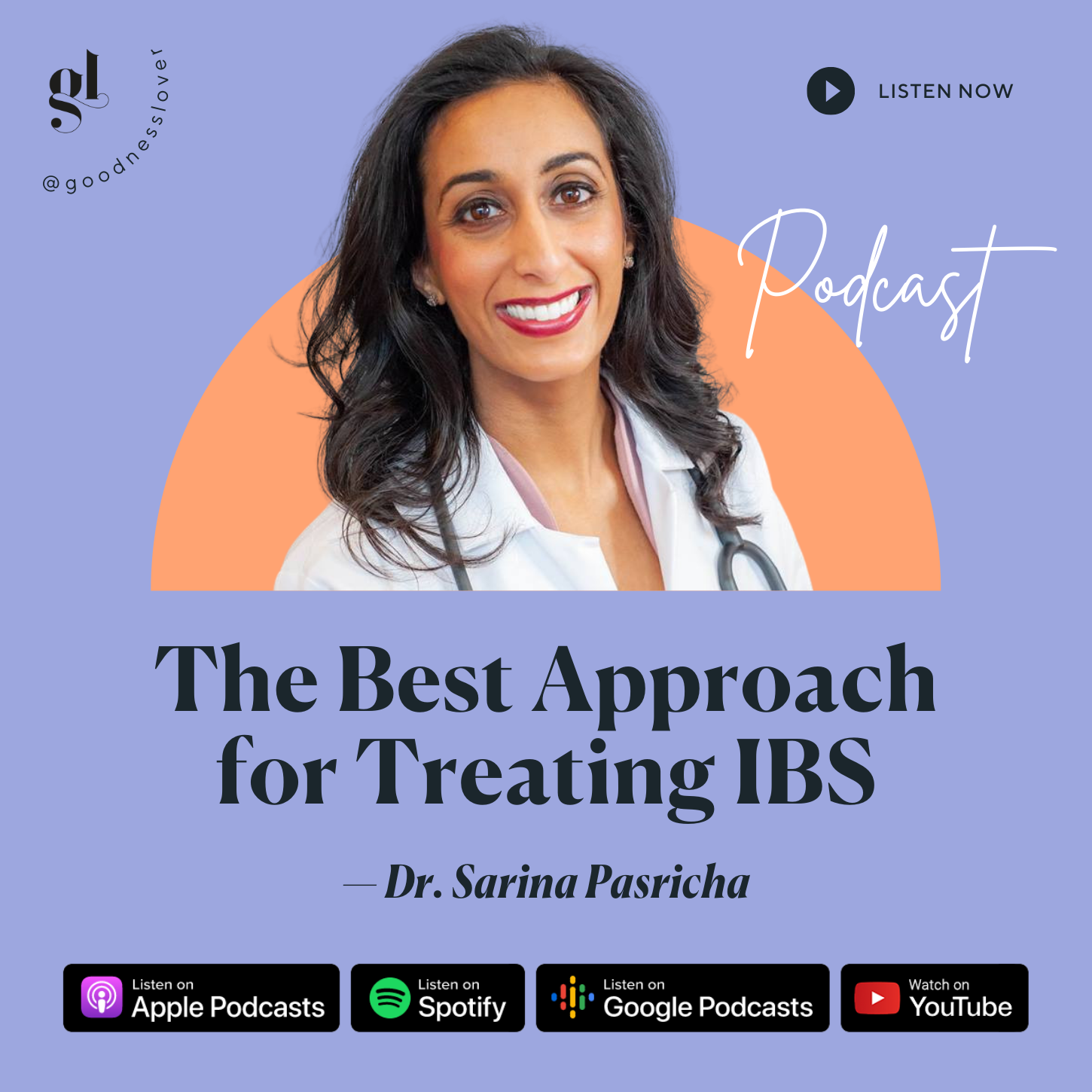




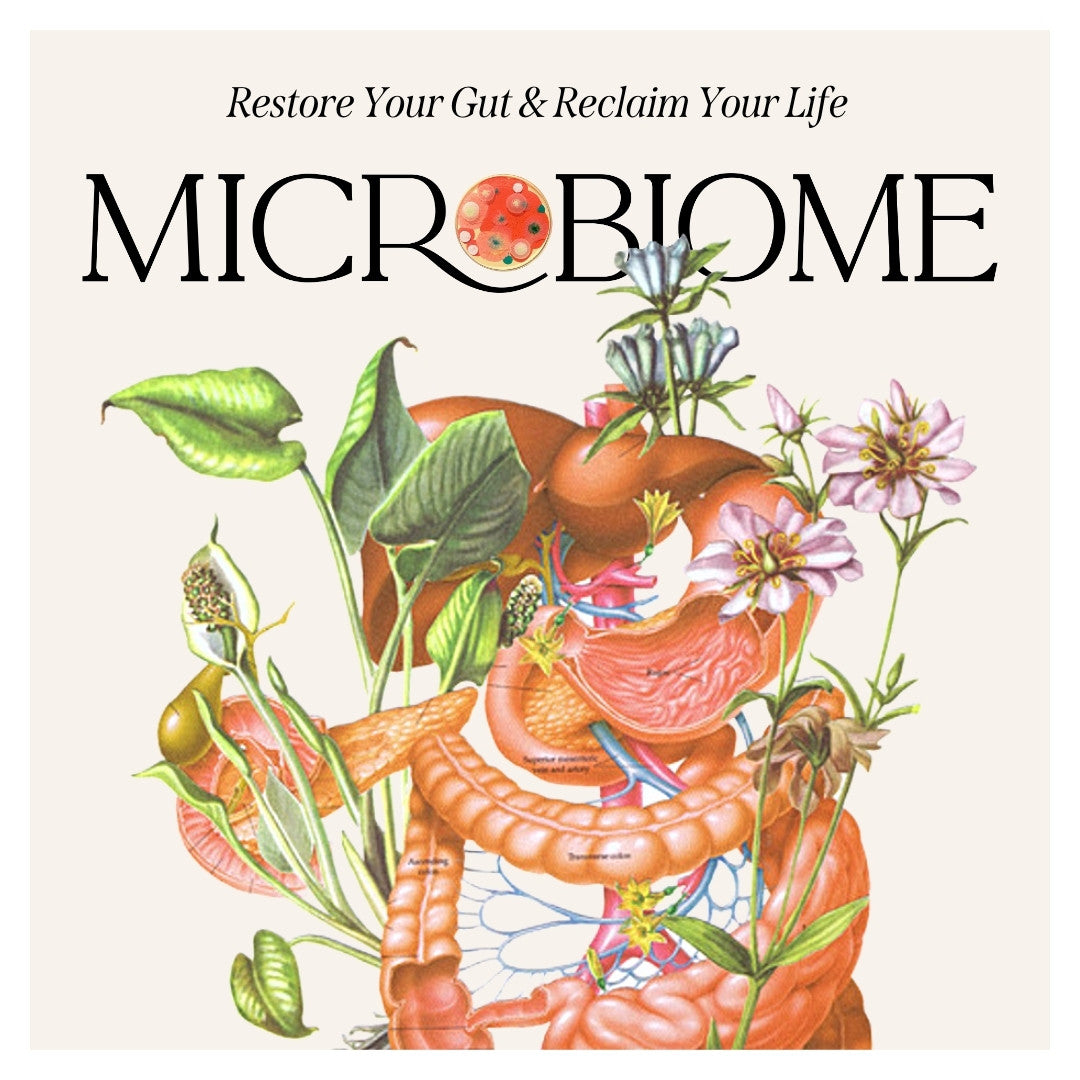

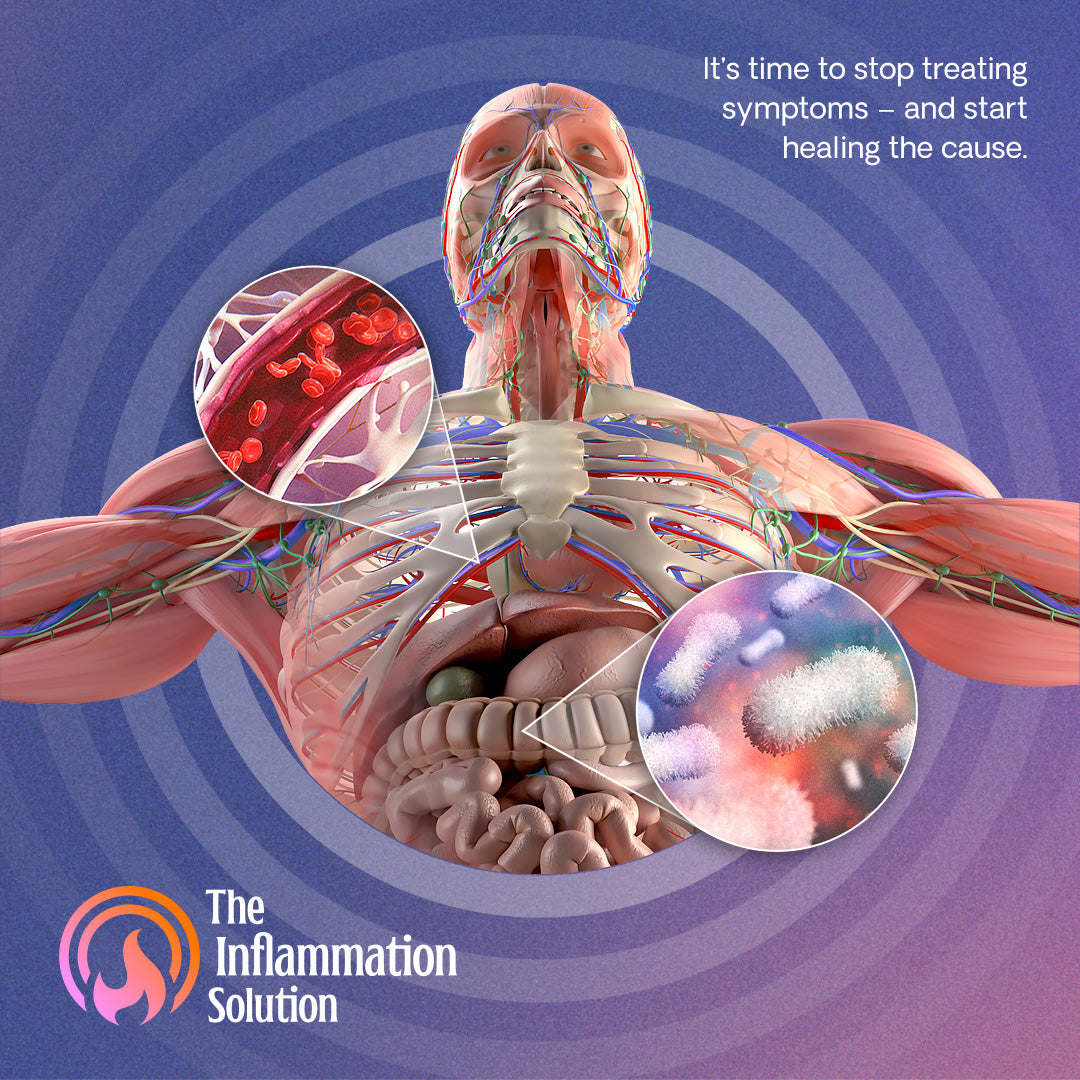
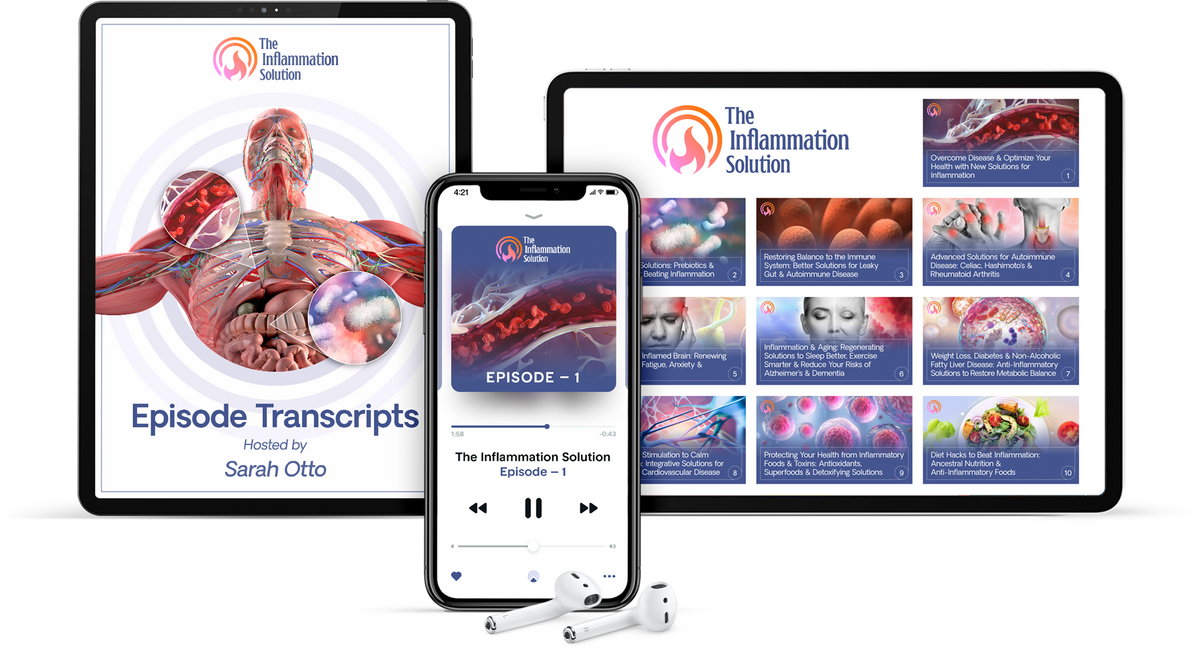
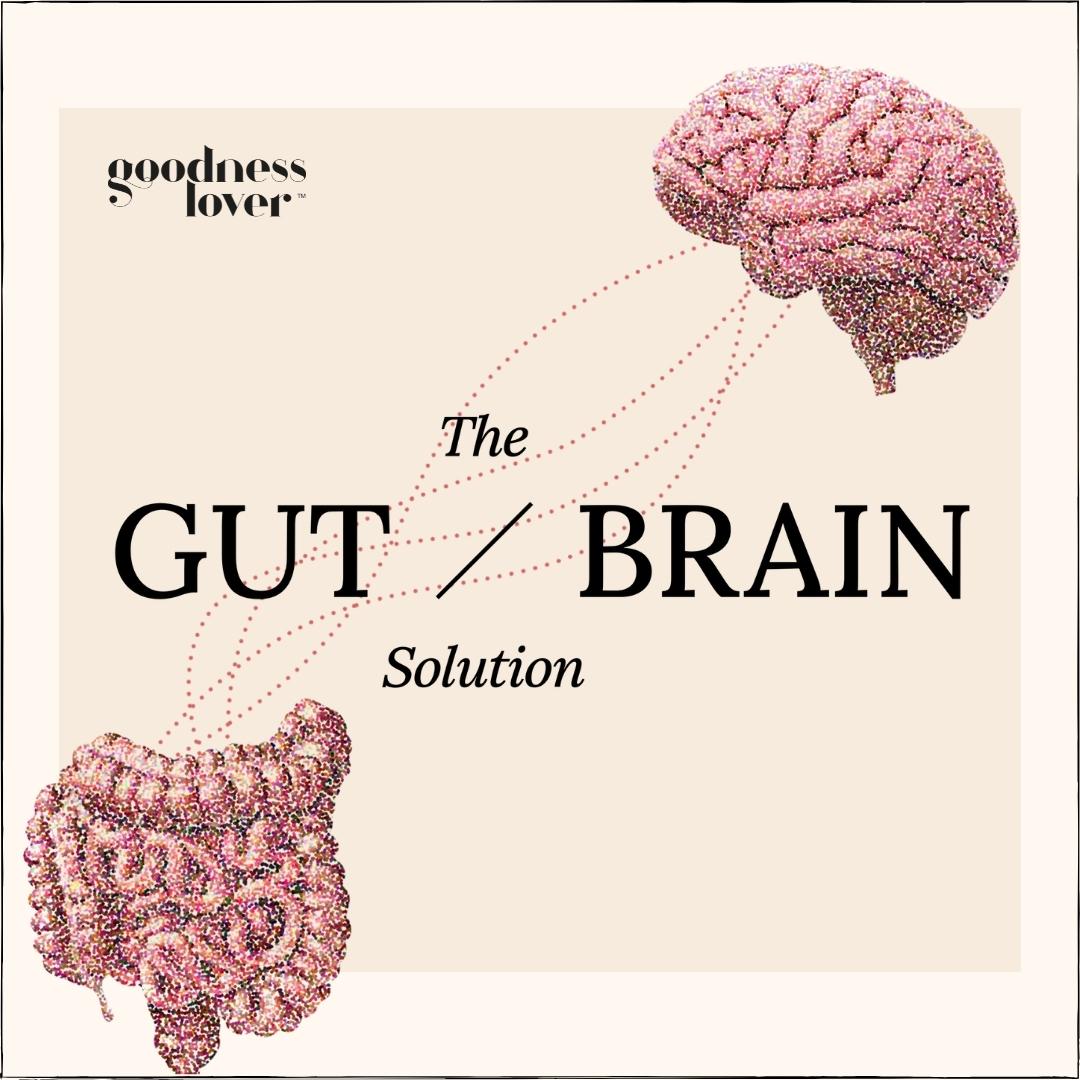


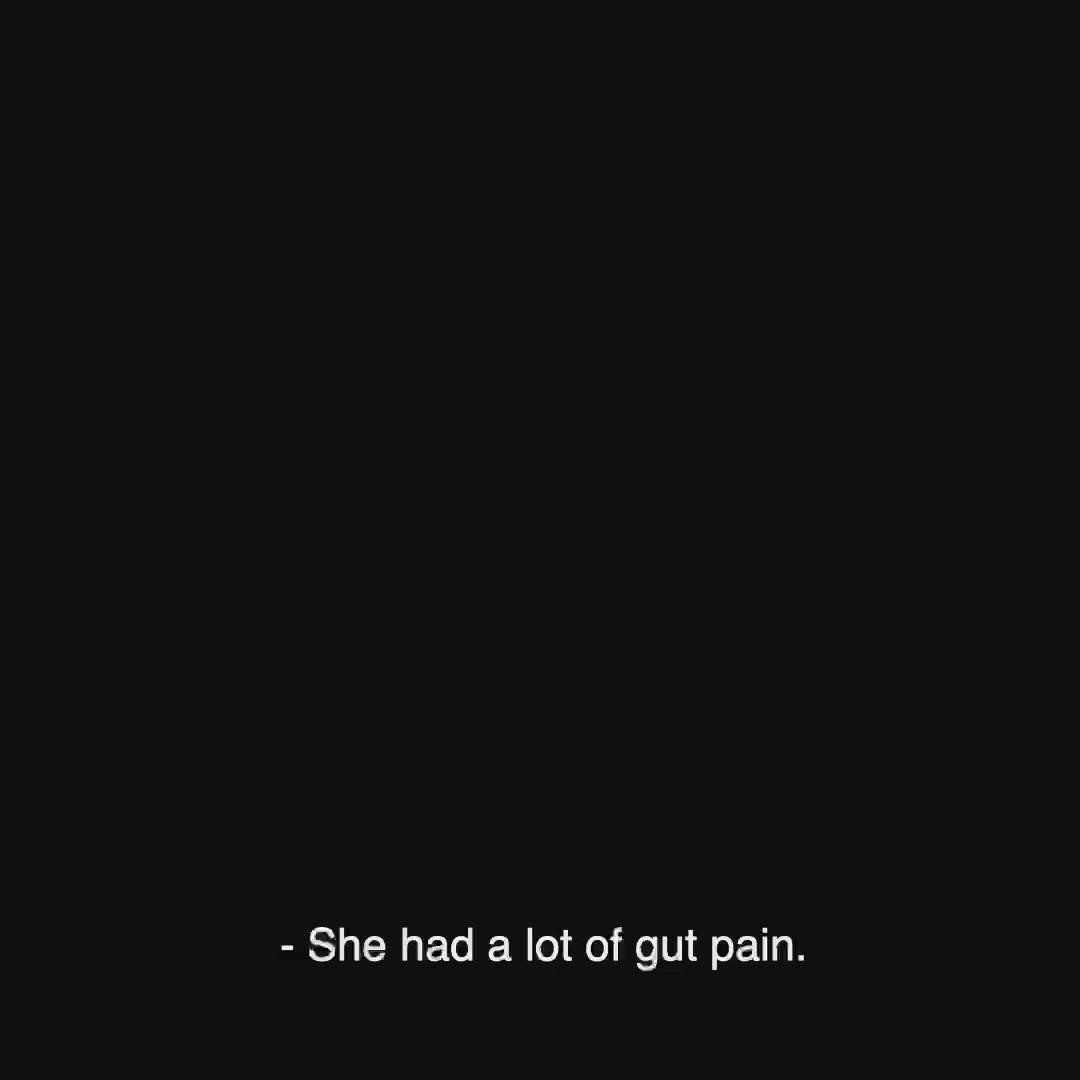
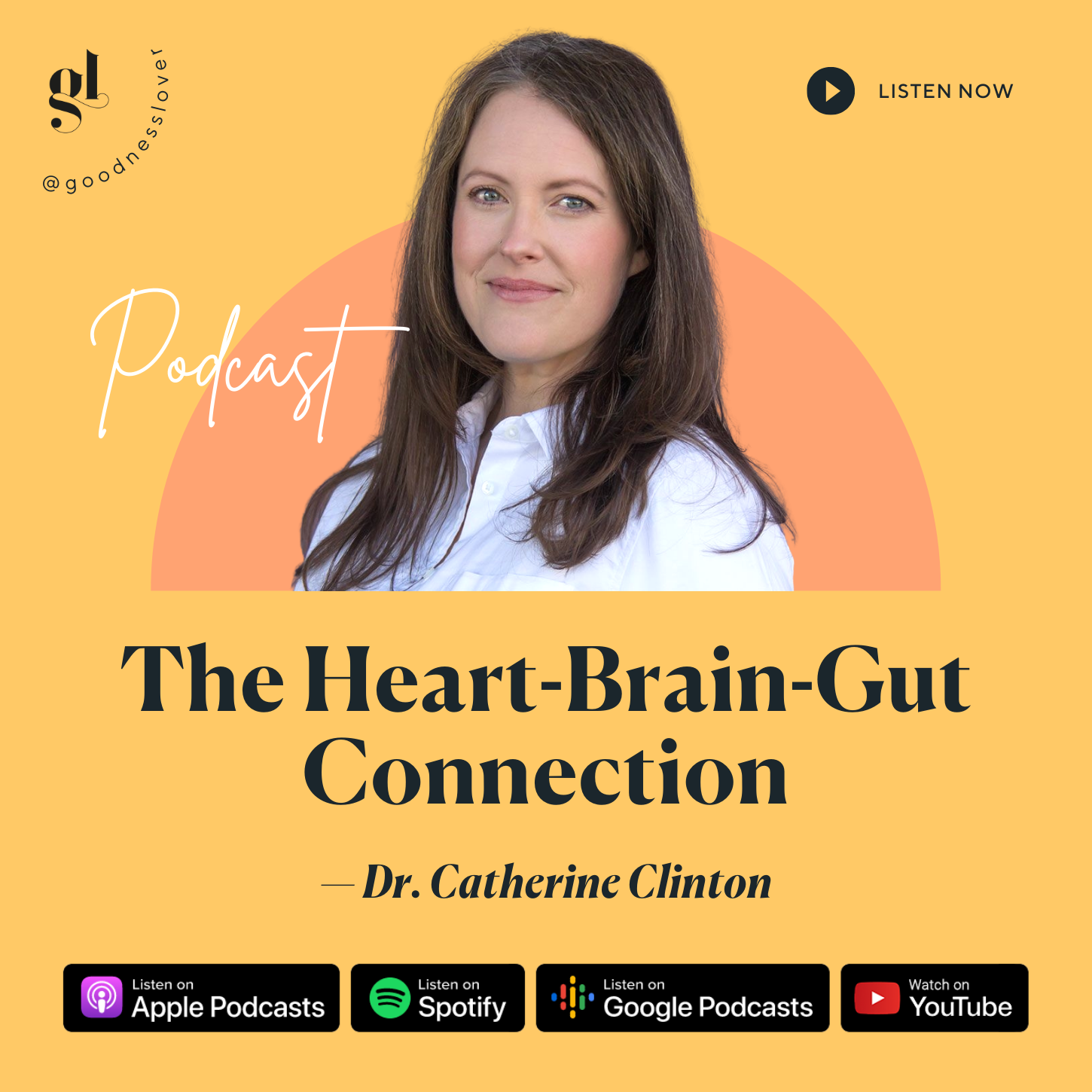
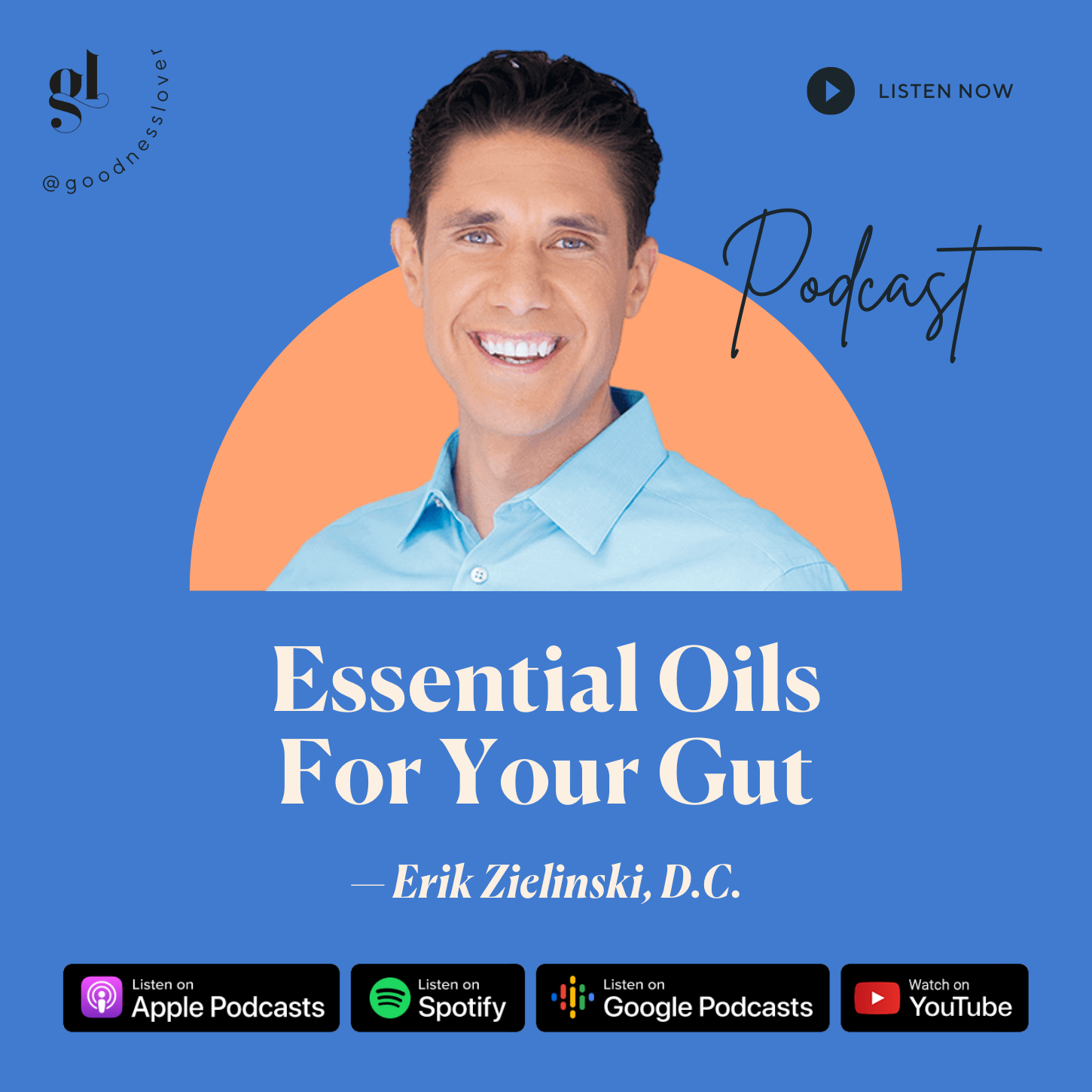

What Do You Think? Comment Below: